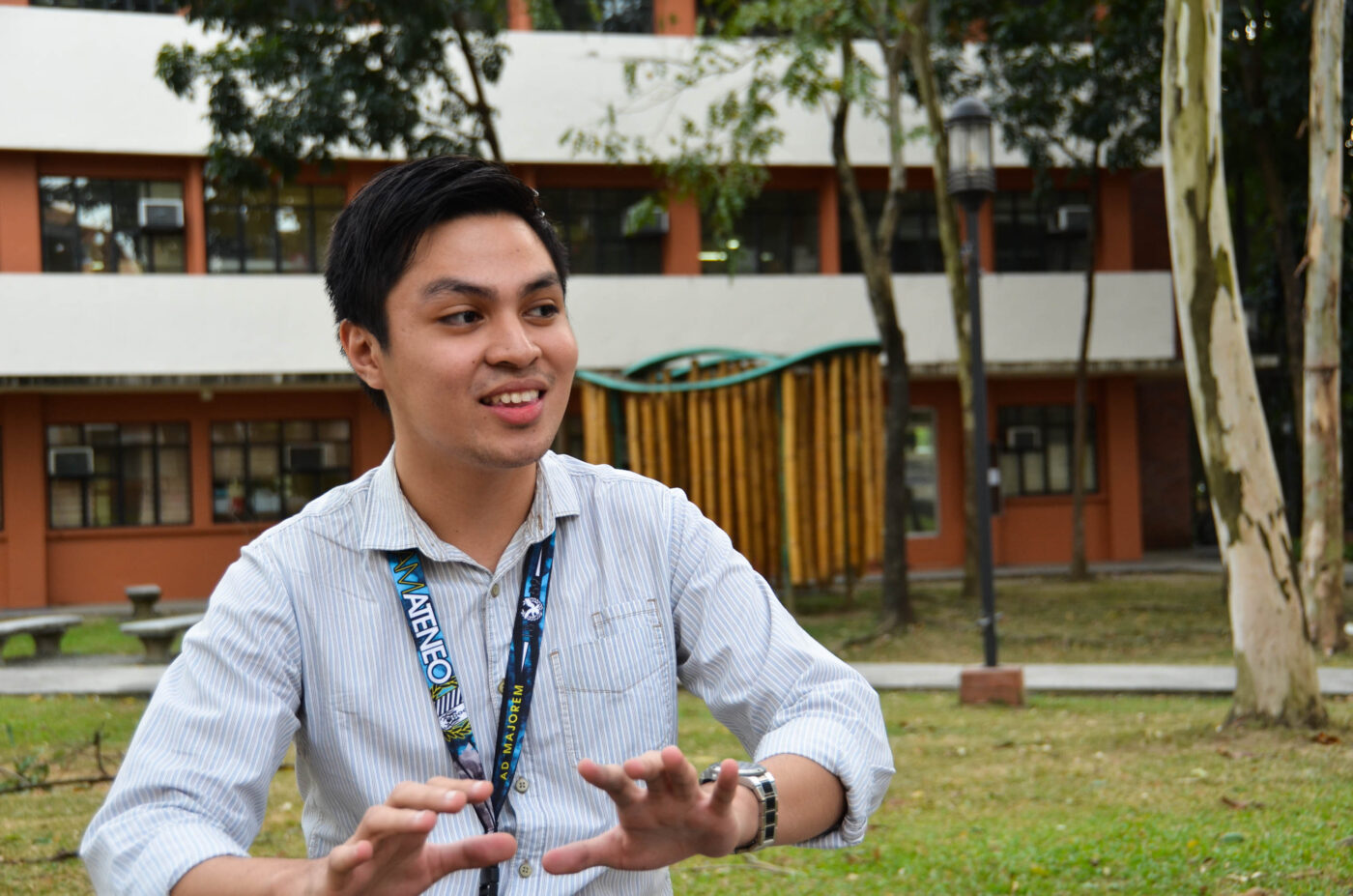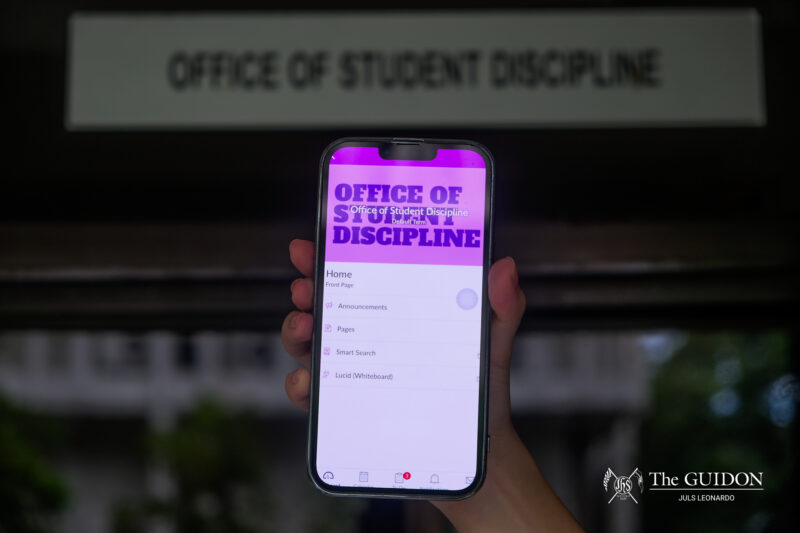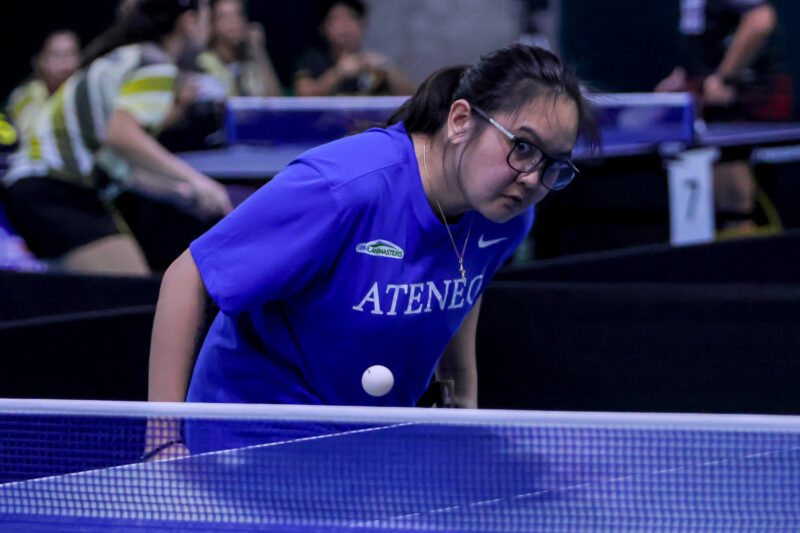Photo by Alexis A. Casas
SCHOOL OF Social Sciences (SOSS) Secretary-Treasurer Marvin Lagonera fully respects and accepts the final verdict of the Ateneo Student Judicial Court (SJC) magistrates, who acquitted him.
The SJC Prosecutor’s Office, headed by Chief Prosecutor Clyde Maramba, charged Lagonera with two impeachment complaints: Illegal appointment of Central Board (CB) representatives and Executive Officers (EOs) and failure to keep the records of the School Board (SB) transparent.
In the official verdict released on January 10, the Court acquitted Lagonera on both counts. However, he was found guilty of mismanagement for failing to keep the SOSS SB accountable and transparent.
Lagonera’s sanctions include the following: A reprimand from Sanggunian President Dan Remo, which will be made available to the student body and mandatory work for the Office of the Secretary-General, the nature of which will be specified by Sanggunian Secretary-General AJ Elicaño.
Lagonera’s first impeachment case was tried in court on December 20, 2013. The hearing for the second case was cancelled, however, because the parties involved had no common time to hold the trial before January 10, the deadline of the verdict.
The defense, led by Andre Miko Alazas, filed a motion to reconsider the cancellation but it was denied by the SJC.
The magistrates instead based its decision for the mismanagement case on written statements submitted by the prosecution and the defense on January 9.
While he is happy about his acquittal, Lagonera said he was still hoping the second hearing would push through.
“It was the only thing I was asking from the Court—to be given full due process. A trial would have shown the complete story behind what really happened and I believe that our witnesses were crucial to the main issues raised for the mismanagement case,” he said.
The prosecution, however, was understandably upset with the verdict.
“[The Court] decided that he has done these things but they’re not punishing him for it in the proper way,” said prosecutor Mayen Pineda, expressing her disappointment because she said the prosecution argued their side well.
Pineda believes it was the SOSS SB, and not the prosecution, who truly lost during the trial.
“Marvin is actually a nice guy but good intent doesn’t mean that he can do these things. The ends don’t justify the means and we believe that the [SOSS] School Board is the one who lost in the end,” Pineda said.
21 days
Like Lagonera, both the parties involved wanted a trial for the second impeachment case.
Alazas said he found the cancellation to be “problematic” and “unfair” for Lagonera because the defense was not given the chance to cross-examine Elicaño, whose testimony played a significant part in the prosecution’s arguments for the mismanagement case.
According to Alazas, the defense thinks Lagonera would have been acquitted altogether if the second hearing was held. As of press time, however, the defense has not filed any motion to appeal the Court’s guilty verdict.
As for the prosecution, Pineda said they wanted to have the second trial as well because they wanted the public to know the arguments of both sides.
However, Pineda said she does not fault the magistrates for the cancellation of the second hearing because they were simply following the procedures mandated by the 2005 Constitution of the Undergraduate Students of the Ateneo de Manila Loyola Schools.
The Constitution gives the SJC a maximum of three weeks to sit en banc, hear, try and resolve any complaints involving the constitutionality, legality or jurisdiction of the acts, policies and resolutions of Sanggunian officials.
Before the impeachment
According to Lagonera, there was an OSA formator—whom he refused to name—who warned him that there was “a group of students” who wished to impeach him just a week after he assumed his position. He said he became very careful in his performance as Secretary-Treasurer after learning about this rumor.
While Lagonera offered no speculation as to why the prosecution began its investigation in the first place, he expressed his concern that the prosecution may have been “one-sided” because he was not interviewed by the prosecutors.
“And yet they (the prosecutors) say, for instance, that they were fighting for the truth, but they never really listened to my side,” he said.
Chief Prosecutor Maramba argued that Lagonera would have eventually found out what they were investigating him for when the prosecution officially filed the complaints.
“What’s the point [of informing the defense about the details of our investigation]? So they can anticipate it before we file the cases? So that they can explain?” he asked.
Support from Crusada
According to Lagonera and Lead Counsel Alazas, the Christian Union for Socialist and Democratic Advancement (Crusada) played a huge role in the success of the defense during the trial.
Crusada is the only accredited political party in the Ateneo. Lagonera and all members of the defense team are part of Crusada.
All the defense’s motions were posted in Crusada’s Facebook and Scribd accounts. The party also released a statement expressing its full support of Lagonera.
According to Alazas, Crusada members currently involved in the Sanggunian helped the defense find and formulate their arguments. Crusada alumni also guided them as regards the legal aspects of the case.
However, Alazas maintained that the defense members were the ones who wrote their motions and arguments.
Furthermore, Lagonera said that Crusada became his “companion” during the course of the hearing. He says Crusada helped him in the “psychological, emotional, personal aspects of this whole impeachment.”
“They made me happy when I was almost really tired of the case,” he said. “In times when I needed them the most, they openly and actively supported me.”
Proposed constitutional amendment
The parties involved in the impeachment case hope that a constitutional change will take place because certain parts of the Constitution are quite vague.
“For example, what do you do after a massive failure of elections, when you only have two or three duly elected course reps? Where do you come up with appointments?” Alazas asked.
Pineda said it was very difficult for both the prosecution and the defense to properly interpret the Constitution.
Furthermore, Alazas and Lagonera want reforms within the SJC, questioning why the institution has been given both judicial and investigative powers.
“Since the start, we were wondering why the prosecution and the magistrates literally hang out in the same room… You could just imagine having the ombudsman and the Supreme Court [justices staying] in the same office,” Alazas said.
Lagonera said that, while the magistrates made a fair decision regarding his impeachment cases, a possible conflict of interest may arise in the future from within the SJC, given its current structure.
However, Lagonera still believes that it is never the goal of an investigative body like the SJC Prosecutor’s Office to impeach officers.
“I think their role is precisely to guide, direct and advise officers in a constructive and helpful manner rather than promote a culture of destruction within the very institution we are all serving,” he said.
“I think this is one of many symptoms of how Sanggunian has only been reproducing the current political system of our country. The point is to change it.”







